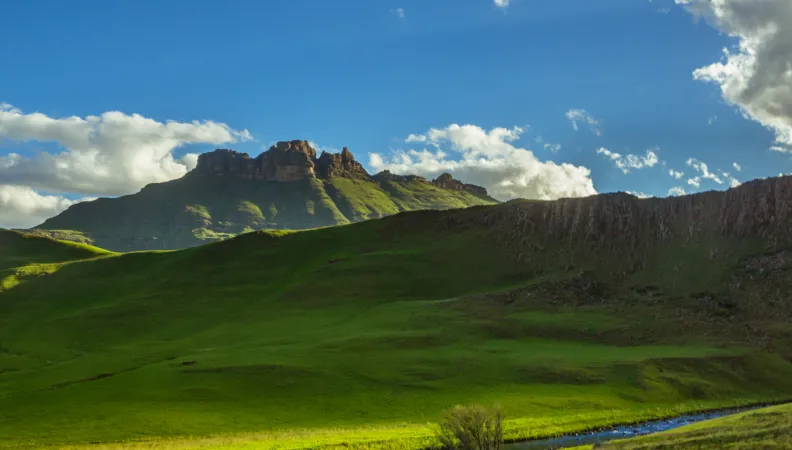Share the page
Restored rangelands enhancing prosperity in Southern Africa
Published on
Amos Thiongo Regional Director, Conservation Finance Africa Conservation international

Private Sector & Development #35 - Preserving biodiversity: the private sector in action
To mark the COP 15 of 2021, the 35th edition of Private Sector & Development imagines the role of the private sector in financing biodiversity and proposes steps to better involve businesses in the restoration of the natural environment.
In the drylands of Southern Africa, land degradation is increasing, reducing nature’s ability to regenerate pastures to sustain livestock and wildlife. Unaddressed, degraded rangelands can become “wastelands” that yield few ecosystem services, driving communities into poverty. This jeopardizes conservation efforts and tourism. Addressing these issues requires a holistic solution comprising grazing systems informed by traditional knowledge, science and the power of markets.
Livestock is an important part of the GDP of Southern African countries and is critical for the survival of livestock-owning households. Recognizing this, conservationists are increasingly turning to the private sector to incentivize better grazing practices. A motivator for private sector investment in conservation and restoration is returns. Many private sector players, through intermediaries, buy and process livestock and livestock products from communal rangelands. Conservationists have an opportunity to show participants that when these areas are properly managed, livestock productivity increases. This means that the market is assured of continued and improved supply. The impact of conservation directly translates into earnings.
WORKING WITH LOCAL COMMUNITIES
Previous examples of successful private sector engagement in the sustainable management of rangelands in the region are increasingly available. An example is Umzimvubu, in South Africa, a highly biodiverse, critically important water catchment area, which due to unsustainable livestock practices had undergone years of degradation. Conservation South Africa and other partners under the Umzimvubu Catchment Partnership Platform have been working with communities since 2015 to transition to more sustainable rangeland management. Under the Partnership, communities commit to adopting restorative, planned grazing systems; protecting wetlands; and removing invasive plant species. In return, for-profit Meat Naturally PTY organizes livestock auctions for compliant farmers, inviting buyers to the auctions and providing market access to the community. In 2019, turnover was $715,000, benefitting 1,398 families. This has incentivized communities to transition to sustainable rangeland management. Wetlands are being restored, with improved water quality and quantity; native grass cover is recovering; and the invasive wattle tree is being removed. The result is better quality pastures, with a resultant improvement in the quality of the livestock. In Umzimvubu, NGOs play the vital role of organizing the community and helping them meet their environmental commitments. They also help communities to increase productivity and to meet quality requirements. Yet, it is the private sector that drives sustainability. For example, the Meat Naturally auctions ensure that farmers, who previously had no direct market access, are able to earn better prices by cutting out the intermediaries. Conservation agreements provide a transparent framework of engagement. Farmers know what is expected of them and what support they can expect from civilsocietypartners. And private sectorplayers get better quality livestock that has been produced under environmentally sustainable practices. Agreements are based on verified performance.
IMPLEMENTATION OF PRO-BIODIVERSITY VALUE CHAINS
In south-western Ghana, the NGO Noé supports implementing pro-biodiversity value chains. Here, the Kwabre-Tanoé Forest provides many ecosystem services to local communities and is home to exceptional biodiversity, including the Roloway monkey (Cercopithecus roloway), one of the 25 most endangered primates in the world. In order to protect this habitat, threatened by deforestation and poaching, a conservation agreement between the community organization (CREMA Ankasa-Tano) and the Savannah Fruits Company (a coconut oil trader) was signed. This conservation agreement defines the community’s commitment to preserving the forest through ecological monitoring, reforestation, and compliance with organic certification standards. In turn, the Savannah Fruits Company provides technical support, buys coconuts from farmers at a fair price plus a premium, and contributes one pesewa per coconut purchased to the Community Conservation Fund. This generates $5,500 per year for the Fund, enabling the community organization to become financially self-sufficient. In 2015, Conservation International launched the Conservation Agreements Private Partnership Platform (CAPPP) to catalyze private-sector support for biodiversity conservation and to maintain ecosystem services at important biodiversity sites. With support from the GEF Earth Fund, and in collaboration with the United Nations Environment Program, the implementing agency, CAPPP has sought to forge mutually beneficial partnerships between the private sector and local communities and landowners, who commit to conserving biodiversity, reducing land degradation, supporting climate regulation and promoting sustainable natural resource management. By 2020, a total of 1.2 million hectares of highly biodiverse area, spread across nine countries, had been enrolled in conservation agreements under CAPPP. Following suit, AFD has funded the “Pro-nature Enterprises for the People of Southern Africa” initiative. In partnership with Conservation International and local NGOs, this collaboration will further unlock private sector support for protecting one million hectares of critical transfrontier conservation area in Southern Africa. In this model for improving rangeland management, local communities benefit from establishing supply-side relationships with private players in tourism, livestock, and related sectors. Communities commit to enhanced human-wildlife coexistence and sustainable management of their rangelands, through culturally appropriate and climate-smart livestock practices.
CONCLUSION
An urgent need and opportunity exists to shift localized economic activities in areas important for biodiversity, from driving degradation to environmental stewardship, taking a market-based approach. The private sector in collaboration with civil society has the power to drive this shift. Economic disruptions brought about by Covid-19 present an opportunity to reset engagements between the private sector, producer communities, and civil society, to build more ecologically friendly production practices that benefit recovering communities and the nature that they depend on.

